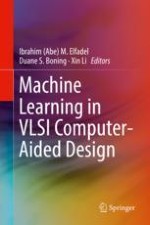2019 | OriginalPaper | Chapter
13. Learning from Limited Data in VLSI CAD
Author : Li-C. Wang
Published in: Machine Learning in VLSI Computer-Aided Design
Publisher: Springer International Publishing
Activate our intelligent search to find suitable subject content or patents.
Select sections of text to find matching patents with Artificial Intelligence. powered by
Select sections of text to find additional relevant content using AI-assisted search. powered by
